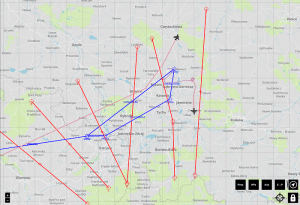CLS Iridium RUDICS service used to relay measurements of green house gas concentrations in our atmosphere
- February 6, 2019
- Category: Testimonies

Measuring carbon dioxide and methane gas in our atmosphere is crucial to understanding global warming. These two gases have been recognized by the International Panel of Climate Change as the most important of Earth’s greenhouse gases, and together are widely considered to be responsible for global warming.
That’s why the German Aerospace Center (DLR) has equipped special aircraft to measure the presence of these gases in the air. To do so, they deploy up to five scientific aircraft to conduct simultaneous measurements using different sondes. These sondes make measurements in strategic areas, such as downwind of known sources of emission like coal-fired powerplants or volcanoes.
Relaying observation data from air to ground
The objective of CoMet is to improve understanding and better quantify the carbon dioxide and methane cycles. Through analysis of CoMet data, scientists will gain new knowledge on global distribution and temporal variation of GHG. These findings will help to predict future climate change and assess its impact.
But this mission wouldn’t work without real-time communication between ground teams and air-borne teams, as well delivery of GHG concentration data to the ground instantaneously.
PLANET: a collaborative mission management service

To ensure communication between the ground and scientists in the air during the CoMet mission, DLR uses PLANET, a collaborative mission management service, designed by ATMOSPHERE. PLANET allows ground teams to communicate and interact with flight crew on board several of the scientific aircraft as well as exchange data collected by the sondes in real-time with an embedded Iridium Core 9523 modem thanks to CLS’s Iridium RUDICS service.
As Katrin Witte, Head of department “Project Management” at German Aerospace Center, Flight Experiments, explains:
“It is extremely helpful to have a stable communication between the engineers and scientists on board and the team on ground. Data from the instruments on board of our aircraft can be transmitted to the ground in real-time where the gathered data can be evaluated by a larger amount of people than on board. The scientific crew on board can also chat with the team members on ground. That way, experts on ground can support the team on board of the aircraft.”
For this mission, up to 5 scientific aircraft were mobilized to conduct simultaneous measurement using different instruments. PLANET system was on-board three of them to help the synchronization between the teams.
Operational services and support
With a 24/7 operations center and 12 million messages processed per day, CLS is a key Iridium partner for environmental applications.
ATMOSPHERE has been providing PLANET service to scientific and flight test communities since 2012. PLANET service has been successfully used in more than 30 different flight experiments, and cumulates around 5000 flight hours.
CLS, a subsidiary of the French Space Agency, CNES, and IFREMER, provides scientists with hardware and related telemetry solutions. Being the unique Argos provider and a world-renowned certified Iridium VAR, CLS offers an unparalleled range of services topped by excellent support. ATMOSPHERE works with CLS for Iridium modems & satellite communication services for many applications.
To learn more
![]() Read the article on Atmosphere’s website
Read the article on Atmosphere’s website
Photo by veeterzy on Unsplash.
